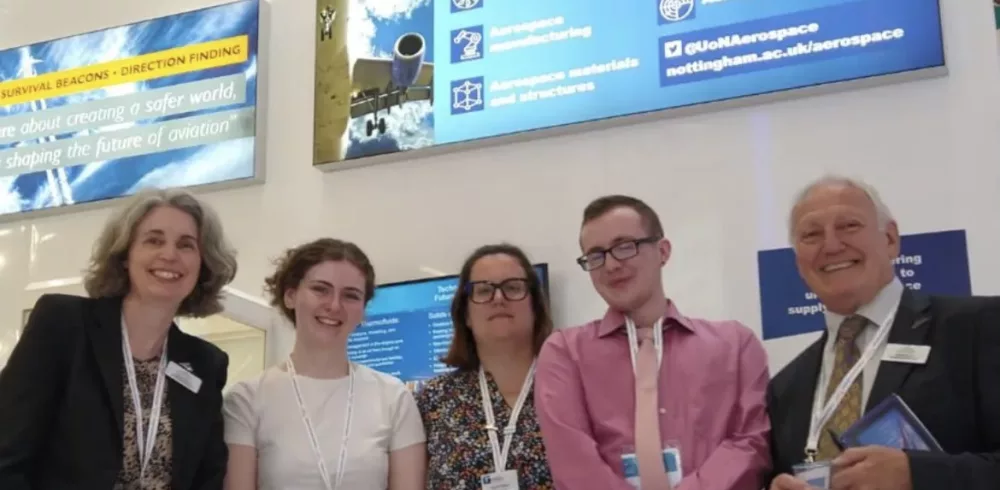The University of Nottingham ’s Aerospace Unlocking Potential (UP) programme has come to an end, after supporting more than 270 small- and medium-sized enterprises (SMEs) across the Midlands over the past three years.
Designed to help smaller companies develop new technologies and solutions to make aviation greener, the £20 million programme was delivered by the University of Nottingham’s Institute for Aerospace Technology (IAT) and the Midlands Aerospace Alliance (MAA) between 2020 and 2023, supported by the European Regional Development Fund and Midlands Engine.
The programme not only provided funding for projects but also offered companies unique access to industry experts, academic support, and university facilities that might otherwise have been unattainable.
Professor Pat Wheeler, Global Director of the University of Nottingham’s IAT and Head of Power Electronics in the Faculty of Engineering, said: “The past three years have seen us support more than 270 SMEs across the Midlands, with more than £11 million of private and public investment combined supplied to a plethora of projects. But this programme goes further than facts and figures, it’s afforded businesses the opportunity to create and improve a wide variety of new technologies that will take the aerospace industry to new heights.”
Among the companies that have benefited from Aerospace UP is Skyfarer Ltd, which used its funding to develop a prototype system for drone operations that has created the capability to deliver medical supplies to a radius that extends 40km beyond the pilot’s line of sight.
The system is linked to an app that allows the customer to see everything about their deliveries, including position, temperature, and any shocks the payload has experienced. As part of the project, drones were successfully flown beyond the line of sight in remote areas of Wales, marking a UK first for drone operations over land.
Georgia Hanrahan, Chief Operating Officer at Skyfarer Ltd., said: “Being supported by Aerospace UP has allowed us to turn our vision into a reality and create some milestone achievements in Unmanned Aircraft Systems (UAS) regulations in the UK. A big thank you must go to the team for believing in us from the start and putting air under our wings, quite literally, so that we can start benefiting the healthcare industry with this technology.”
The programme’s successes have been celebrated this month, first at a showcase event hosted at the university’s Jubilee Campus, where SMEs that Aerospace UP has supported presented more than 50 new technologies to the 150 people in attendance. Followed by the Paris Airshow, where a wall display next to the University of Nottingham’s stand with the MAA promoted projects and technologies developed by companies made possible through Aerospace UP. The University of Nottingham’s IAT team also discussed ongoing opportunities available for companies and supported the MAA Paris Airshow networking reception, which promoted and celebrated the strength and depth of the aerospace supply chain in the Midlands.
Dr Andrew Mair, chief executive of the Midlands Aerospace Alliance, said: “Aerospace UP has been a flagship programme that is showing the global aerospace industry just how innovative our small companies can be. It’s brilliant that we have been able to work alongside the University of Nottingham to support these companies to develop the new technologies the aviation sector needs for the future.”
Although the programme has come to an end, the IAT plans to continue to strengthen the links it has created with companies across the region and the MAA to create new opportunities for collaboration in the future.
Professor Wheeler added: “What we’ve been able to do with Aerospace UP is establish a flourishing innovation ecosystem that brings together industry, the university, and the MAA and, moving forwards, we can use this as a launchpad for further work in the future. For example, we’re using this as a template for the work we’re doing with the University of Nottingham Italy by collaborating with the aerospace cluster in the Campania region.
“Closer to home, we’re continuing to provide technical services for the Midlands community, as well as access to our world-leading facilities. So, while Aerospace UP may have finished, the relationships and collaborations we’ve forged are continuing to flourish, and this is something I hope will continue in the years to come.”
For more information about Aerospace UP, please visit: www.aerospaceup.com/
Manufacturing & Engineering Magazine | The Home of Manufacturing Industry News









